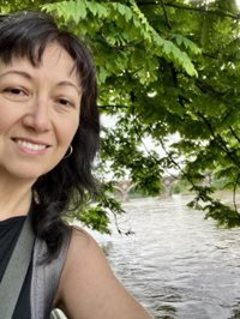Combining Her Love for Linguistics and Computer Science

Zina Pozen
Software Development Manager, Search Platform, Point Inside
Zina graduated from the UW Master of Science in Computational Linguistics program and now works on product search issues at a company called Point Inside. In this interview, Zina shares how this degree allowed her to revisit her undergraduate passion for linguistics.
“It was love at first sight,” she said. “The program offered classes that fit my interests and had strong industry ties.”
What is your educational and professional background?
I hold a bachelor’s degree in computer science from NYU. For 16 years, I worked as a developer across the software industry, from small startups to Microsoft, where I contributed code to five Windows releases.
Before I became a software engineer, I studied linguistics at Moscow State University for two very intense and exciting years. I took classes in phonetics and phonology, morphology, syntax and semantics. I also had a good introduction to historical linguistics with the Old Slavonic and Old Russian languages.
What prompted you to go back to school to study computational linguistics?
Given my background, I had always secretly hoped I would return to linguistics one day, while leveraging my computer science expertise. The huge surge of interest in computational methods in linguistics in the last decade, the proliferation of unstructured data on the Web, the readily available storage and computing, and the effectiveness of statistical approaches have come together to create a natural language processing renaissance. I knew I wanted to be a part of it.
Why did you choose the UW Master of Science in Computational Linguistics in particular?
It was love at first sight. One evening, I was sitting at home and the trapped inner linguist in me somehow got this idea that I should check to see if the UW has a master's program in computational linguistics. Within seconds I was on the program's website, and within minutes I knew I wanted to enroll. The program offered classes that fit my interests and had strong industry ties. Plus, it was right here in Seattle, and I could take classes online if I needed to.
What did the faculty and instructors bring to the learning experience?
The faculty are all very knowledgeable and have different types of experiences. Some have a deep research and academic background, while others have experience in the industry. That’s all valuable — I appreciated the different kinds of perspectives.
Did you take any of your courses online?
I took one class, Shallow Processing Techniques for Natural Language Processing, almost entirely online — between the amount of homework and my busy job schedule, I couldn't afford to spend any time commuting. I found that I actually focused on the presentation better when taking the class online. Even though I lived in Seattle, very close to the UW campus, I valued the flexibility of the online option. I liked that even as a non-online student, if I needed to travel I could still attend my classes online, or watch the recorded lecture later if I had to.
What did your thesis project focus on?
My question was one of the fundamental issues in computational linguistics: Can we build a model of semantic likelihood of a sentence interpretation? The biggest issue with linguistics is ambiguity. Words have multiple meanings, and you can interpret phrases differently. I tried to build a model that would model the actual likelihood of human interpretation. So it would factor in something like, “Are people more likely to talk to people or to animals?” Things like that. The semantic model worked fairly well on its own, almost as well in some settings as models traditionally based on syntactic structures. Then I tried to combine that with the traditional syntactic model to help select the intended interpretation.
Did earning this degree help you get a job in the field of computational linguistics?
Yes, it did help me land [my current] job. I've been working at a company in Bellevue called Point Inside. I am working on search, specifically product search. The company [focuses on] mobile applications, and the purpose is for people to go into big stores and be able to find things and be routed to them. I've been a search engineer there, and right now I'm in charge of the whole search [function].
Do you feel the program prepared you well to work in this field?
It did. I did not take any classes on search specifically, but the last day of my capstone, we did do information retrieval — so that was hugely useful. I'm using it at my job. And when I was in the program, I ran into somebody who worked with Point Inside, and we talked. I said what I was learning, and he decided they needed to hire me. He reached out a few months later out of the blue, and very enthusiastically recruited me.
What would you say is the best thing about this program?
It’s run by people who care. You know all the faculty are very passionate and are constantly looking for ways to stay relevant. And they’re very engaged with both the research community and what’s going on in the industry. They really care about graduates, and they really care about people.